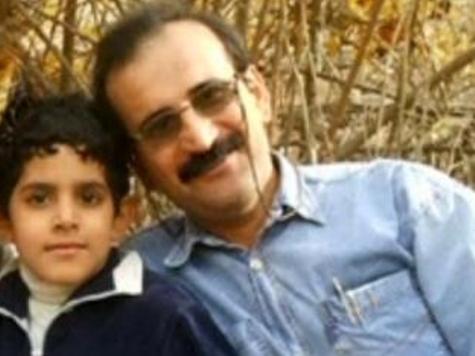On the dawn of 1 June 2014, the Iranian regime proceeded with the execution of political prisoner Gholamreza Khosravi Savadjani. The sentence was carried out despite international appeals for its immediate halt.
According to the Prosecutor’s Office of the Iranian regime, Khosravi was charged with “Moharebeh” (enmity against God) through providing information and financial support for the People’s Mojahedin Organization (PMOI/MEK), the main opposition to the clerical regime ruling Iran.
A professional welder from Abadan (Southern Iran), Khosravi, 49, had served a total of 12 years in Iran’s prisons, including 40 months in solitary confinement under harsh conditions. He was first arrested in the early 80s at the age of 16, and spent five years in Kazeroun prison for supporting the PMOI.
In 2007, he was arrested again and sentenced to six years in prison. After serving four years of his time, the Iranian regime’s judiciary charged him with Moharebeh and sentenced him to death for making financial contributions to the PMOI (MEK).
Khosravi was among the inmates of Evin prison’s Ward 350, who were brutally battered by regime forces on April 17, 2014. He spent 23 days in solitary confinement and was denied medical treatment despite the many wounds he had suffered during the raid.
On May 28, he was transferred to the quarantine section, where death row prisoners are kept before execution, and was subsequently transferred to solitary confinement in Gohardasht Prison on the eve of his execution.
The Iranian resistance had warned of the imminent execution of Mr. Khosravi and had called on the international community to take urgent and effective action to stop the sentence from being carried out. Amnesty international called for the immediate halt of Khosravi’s execution, who “was sentenced to death in an unfair trial on the charge of ‘enmity against God’ (moharebeh).”
In a letter to Dr. Ahmed Shaheed, the United Nations Special Rapporteur on Human Rights situation in Iran, Mrs. Baygom Yadi, Khosravi’s mother, said that her son had been subjected to great injustice and was on the cusp of being killed for having made a small donation to an opposition TV channel. “Please save his life,” reads her letter to Dr. Shaheed.
The execution of Gholamreza Khosravi sparked a wave of outrage inside Iran and abroad. The Iranian resistance condemned Khosravi’s execution and stipulated that the regime had murdered him in retaliation to the resistance of Evin’s Ward 350 inmates.
Mrs. Maryam Rajavi, the president-elect of the National Council of Resistance of Iran, said, “The execution of Gholamreza is a marker of ‘moderation’ in the regime of the mullahs that through executing and slaughtering of PMOI (MEK) members in Ashraf, Camp Liberty, Evin, Gohardasht and other prisons is futilely attempting to keep its devastated and crumbling regime standing.”
Mrs Rajavi emphasized that the leaders of the Iranian regime rely on torture, execution and repression for the continuation of their illegitimate rule, and must be held accountable for their crimes before an international tribunal.
In fear of potential protests over the execution of Gholamreza Khosravi, regime officials banned Khosravi’s family from holding a ceremony in his memory. Khosravi’s remains were buried under heavy restrictions and with the presence of very few relatives.
Iranian intelligence agents have allegedly threatened to arrest Khosravi’s family members in case reports of the burial leak to foreign and social media.
Iran has seen a spike in executions and human rights violation during the tenure of Hassan Rouhani, the regime’s newest president who is seen as a moderate figure by western countries. Critics and human rights activists accuse western states, namely the U.S. and E.U. members, to have turned a blind eye on blatant human rights violations in Iran for fear of harming the nuclear negotiations with the Iranian regime.
The Iranian resistance has reiterated time and again that ignoring the growing trend of executions in Iran is a breach of the International values that all members of the United Nations are committed to and the Security Council must uphold.

COMMENTS
Please let us know if you're having issues with commenting.